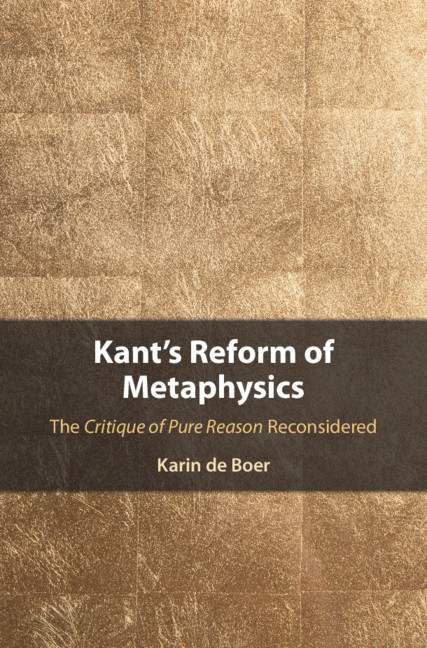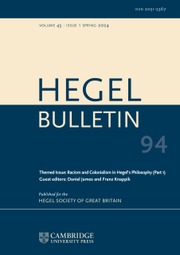Kant's Tribunal of Reason
Kant's Critique of Pure Reason, his main work of theoretical philosophy, frequently uses metaphors from law. In this first book-length study in English of Kant's legal metaphors and their role in the first Critique, Sofie Møller shows that they are central to Kant's account of reason. Through an analysis of the legal metaphors in their entirety, she demonstrates that Kant conceives of reason as having a structure mirroring that of a legal system in a natural right framework. Her study shows that Kant's aim is to make cognisers become similar to authorized judges within such a system, by proving the legitimacy of the laws and the conditions under which valid judgments can be pronounced. These elements consolidate her conclusion that reason's systematicity is legal systematicity.
- A comprehensive study of Kant's legal metaphors
- Proposes a legal account of his theory of normativity
- Provides a novel interpretation of Kant's representation of philosophical systematicity
Reviews & endorsements
‘The simplest objection to Kant's Critical project – the claim that reason cannot critique itself – is one that Kant himself not only anticipated but largely answered. Moller shows how Kant's extensive legal metaphors throughout the Critique of Pure Reason form a coherent whole intended to explain the basis of reason's self-critique. She provides the best explanation yet of how Kant defended his critical project, one that also reveals Kant's deep understanding of natural law theory.' Frederick Rauscher, Michigan State University
‘… offers the reader a detailed and historically rich account of the legal terminology that Kant adopts or references. Møller’s book is a wonderful antidote to the sense one sometimes has, even when one reads Kant in the original, that one is still reading a slightly different and distant language.’ Kantian Review
‘Møller’s book delivers on many of its central claims and should have considerable influence on those interested in Kant’s legal metaphors.’ Jessica Tizzard, Journal of the History of Philosophy
Product details
December 2021Paperback
9781108724050
210 pages
228 × 150 × 12 mm
0.32kg
Available
Table of Contents
- Introduction
- I.1 The cognitive function of metaphors
- I.2 Methodological considerations
- I.3 The primacy of practical reason and epistemic normativity
- I.4 Outline of the book
- 1. The critique as the establishment of reason's lawful condition
- 1.1 The critique as a review of laws
- 1.2 The natural right tradition and the Naturrecht Feyerabend
- 1.3 The critique as a lawful solution to conflicts
- 1.4 Establishing a rightful condition
- 2. The normativity of law
- 2.1 Natural right and positive law
- 2.2 Laws of nature in the natural sciences
- 2.3 A priori laws as objectively valid rules
- 2.4 Laws and principles
- 2.5 The understanding as prescribing laws to nature
- 3. The transcendental deduction and the tradition of legal deductions
- 3.1 Quid juris and the transcendental deduction
- 3.2 The analogy between concepts and property
- 3.3 The transcendental deduction as a legal deduction tracing an origin
- 3.4 The tradition of legal deductions
- 4. The question of fact and the question of law in judicial imputation and in the transcendental deduction
- 4.1 Quid facti and the tracing of an origin
- 4.2 Quid facti and the metaphysical deduction
- 4.3 The question of fact and the question of law in judicial imputation
- 4.4 The transcendental deduction as judicial imputation
- 5. The tribunal of reason
- 5.1 The critique as tribunal
- 5.2 The Antinomies as a legal trial
- 5.3 Empirical experience as testimony
- 5.4 The reader as judge of the critique
- 5.5 The outcome of the critique as verdict
- 6. Moral conscience as the practical inner tribunal
- 6.1 Conscience as an inner tribunal
- 6.2 Self-deception in moral conscience
- 6.3 The problem of an erring conscience
- 6.4 Parallels between moral conscience and the critique of pure reason
- 7. Distinguishing between rightful claims and groundless pretensions
- 7.1 Historical background on judicial authority
- 7.2 Kant on judicial authority
- 7.3 The judicial office in the legal metaphors
- 7.4 Authority and validity of judgments and inferences
- 8. Epistemic authority as both individual and collectively shared
- 8.1 Decrees as the opposite of verdicts
- 8.2 Cognitive attitudes
- 8.3 Epistemic authority and the thinking self
- 8.4 Political aspects of the critique of pure reason
- 8.5 The community of cognisers
- 9. Systematicity and philosophy as the legislation of reason
- 9.1 Other images of systematicity: the organism and the building
- 9.2 The legal metaphors as illustrations of systematicity
- 9.3 Philosophy as the legislation of human reason
- 9.4 Systematicity in the Appendix to the Transcendental Dialectic
- 9.5 The critique as the science of the laws of pure reason
- Conclusion.






